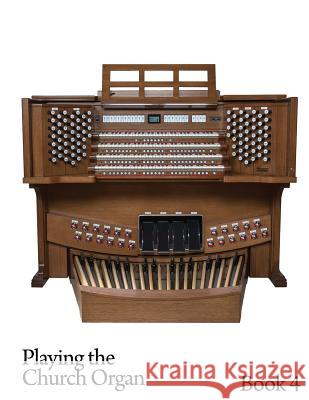Playing the Church Organ - Book 4 » książka
Playing the Church Organ - Book 4
ISBN-13: 9781492772934 / Angielski / Miękka / 2013 / 84 str.
Book 4 Operation of the Organ Controls Exploring USER and Library Access Stops. Here we study the controls of the organ that affect registrations. We fully examine organ stops and their use. As a reminder there are two large groups of stops on these organs, in addition to the stops whose names appear on the stop tablets or knobs, stops that are immediately available at all times to the organist. Voice Palette stops are assigned to stop tablets or drawknobs and tend to be from the same family as the stop name engraved on the face. They may be tonally finished by your technician or local person that does tonal finishing for your area. USER stops on the Roland and Rodgers organs and Library Access stops on Infinity Organ are available for you to choose, play and tonally finish as well. When you select them, you will find a menu that gives you the opportunity to make them sound exactly as you wish. And these changes may be saved to pistons. You may then voice it differently for another piece and save that to another piston. Trying stops out could become boring, but we've eliminated that possibility by including music that you will want to play. This book prepares you to play not only church services, but also recitals as we explore these stops with music by Pachelbel, Franck, Dubois and two Bachs. To conclude the book we've included showpieces by two Vierne's, Boelmann, Lefebure-Wely - all for manuals only with optional pedals. Pachelbel may be known for one piece, but we are beginning to discover that his music may even rival Bach's for variety and depth. As we try a variety of stops we play variations on a theme by Pachelbel. Throughout we offer advice and guidance on playing the organ - choosing tempos, registrations, techniques and more that will make your playing shine. The organs also include some useful orchestral sounds - the Orchestral Oboe is absolutely lovely - and we cover using them as well. Playing the organ State Trumpet with the Orchestral Trumpet at a slightly lower volume level work nicely as well. Theater Organ USER & Library Access Stops Theatre organs are different than church organs, as they are winded at a higher pressure (around 10") than the pressures of church organs. Tremulant works letting a little air escape over and over again. On theatre instruments a lot of air escapes so the pitch drops and the volume drops, giving the organ a "sobbing" sound. These tremulants are built into the USER/Library Access theatre stops. You may enjoy playing these while using our Playing Silent Movies book lessons."
Zawartość książki może nie spełniać oczekiwań – reklamacje nie obejmują treści, która mogła nie być redakcyjnie ani merytorycznie opracowana.











